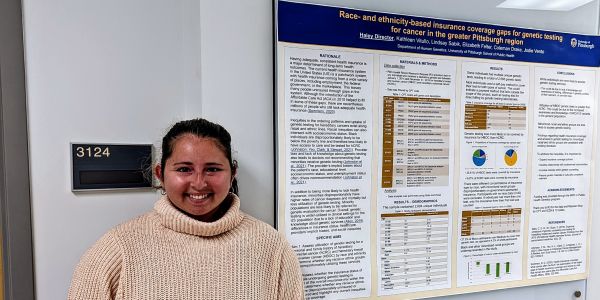
HUGEN student Haley Director won third place among master’s students for the project, “Race- and ethnicity-based insurance coverage gaps for genetic testing for cancer in the Greater Pittsburgh region”.
Dean’s Day is an annual student research competition. Students present their research during multiple poster sessions while faculty members judge presentations for prizes and students evaluate posters for Grand Rounds credit.
Visit publichealth.pitt.edu/deansday to learn more about the competition and see a full list of winners.
Abstract
Cancer has a large public health impact because it affects all individuals, regardless of race and ethnicity. Hereditary breast and ovarian cancer (HBOC) and hereditary colorectal cancer (hCRC) often cluster in families and are implicated in 5-10% of breast cancers and 2-5% of colorectal cancers. Research has determined which variations in which genes are likely to cause HBOC and hCRC, and individuals can receive genetic testing to determine if they are at an increased risk of developing these cancers. However, there are gaps in knowledge of and testing for these variants by race and ethnicity. There are also disparities in insurance coverage for individuals of different races and ethnicities. Identifying individuals with HBOC and hCRC is relevant to public health because cancer treatment is a burden on the healthcare system, and understanding risks of hereditary cancers can guide surveillance and management options. Data of individuals presenting at a UPMC facility between 2014-2019 was analyzed to determine whether there were gaps in access to genetic testing inequities in insurance coverage for the genetic testing by race and ethnicity for HBOC and hCRC. The results showed that approximately 67% of tests were paid for out-of-pocket, which could indicate alternative payment options that fall outside the scope of this project. Genetic testing for HBOC was more likely to be covered by an insurance company than hCRC, as 31.48% of HBOC tests were covered compared to 13.45% of hCRC tests. Furthermore, minoritized racial and ethnic groups were underrepresented in the study, composing only 6.31% of the study population, and overrepresented in Medicaid, with 13.76% of Black individuals and 6.67% of Asian individuals receiving coverage through Medicaid compared to 2.96% of white individuals. The results confirm that race- and ethnicity-based insurance coverage gaps exist for genetic testing for cancer, showing the importance of developing interventions to increase knowledge of and access to genetic testing for minoritized racial and ethnic groups.
5/09/2022